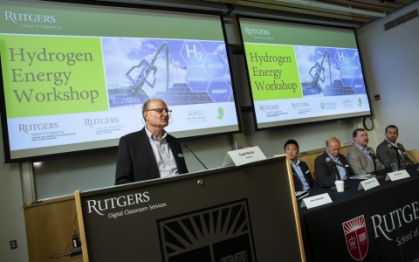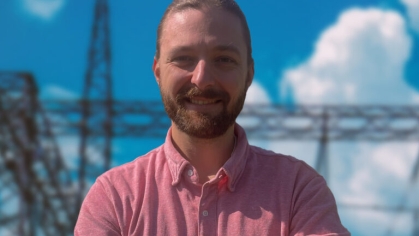SoE Hosts Inaugural Forum on Hydrogen Energy Technologies

More than 175 experts from academia, industry and government joined in an inaugural forum on hydrogen energy technologies and policy at Rutgers School of Engineering this fall just as an infusion of federal money has jump-started initiatives to harness the chemical element for clean energy production.
Hydrogen will play a role, particularly in industrial and heavy-duty transportation sectors, as the United States strives for net-zero carbon emissions by 2050. More than $9.5 billion in federal infrastructure and jobs development money was allocated this year for research and development of clean hydrogen. The inflation reduction act also allowed for significant tax credits for hydrogen implementation for clean energy.
“These are exciting times for hydrogen,” said Mohsen A. Jafari, chair and professor of industrial and systems engineering at Rutgers. He noted the creation of regional clean hydrogen hubs (H2Hubs) across the country that will create networks designed to produce, process, deliver and store hydrogen. New Jersey has joined in a hub with other northeast states. “We’re hoping this workshop will help us move toward a collaborative future,” said Jafari, who moderated the workshop.
Partnerships will be needed since delivery of clean hydrogen presents several logistical challenges. Existing infrastructure can be used in some cases; hydrogen blending is already underway in some natural gas pipelines, including those in areas of New Jersey. But in other realms, such as refueling heavy-duty vehicles, new delivery infrastructure will be needed.
“It is quite clear that we have significant challenges ahead in this domain, so we need academia, industry and government working together to advance sustainable and also long-term solutions,” said Alberto Cuitiño, Rutgers Engineering interim dean. “We will meet energy sustainability and environmental justice goals through public private partnerships. Rutgers is fully committed to a clean energy future,” he said citing the university’s “broad expertise in energy, science and public policy.”
The day-long workshop was co-sponsored by Rutgers’ Center for Advanced Infrastructure and Transportation (CAIT), Fuel Cell and Hydrogen Energy Association, NJ Fuel Cell Coalition, and New Jersey Clean Cities.
“Incredible Challenge”
Plenary speaker Tomas Green, fellow with the U.S. Department of Energy, said the development of clean hydrogen technologies will be a “critical case study about how we can build an industry that does not exist today,” since clean hydrogen is nearly non-existent.
The Paris Agreement treaty on climate change calls for the U.S. to cut carbon emissions by 50% by 2030 and reach net-zero by 2050. It is expected that ten percent of emissions reduction will be achieved through clean hydrogen deployment with the other 90 percent from other technologies,” he said.
Part of that “incredible challenge” is to transform our energy production system with environmental justice in mind since legacy industries placed undue burdens and poor communities, he said, “We have a responsibility to get this right.”
Other panelists emphasized that the publics concerns about safety and workforce development also need to be addressed.
Speakers said hydrogen had been eclipsed by solar, wind and electrification in most public discourse on clean energy. The H2Hubs will be designed with public education and participation in mind and feature training, economic development and apprenticeship programs.
“We need to engage the workforce of the future,” said Catherine Klinger Kutcher, senior policy advisor with NJ Governor Murphy’s Office of Climate Action and the Green Economy. “What we need to do as a state is to be ready and really harness that opportunity.”
Transforming energy delivery
Refineries and ammonia production, where hydrogen is now used, will be an initial focus of the transformation to clean production, Scott said. Then it is envisioned clean hydrogen will play a role in industries and uses that are difficult to electrify, such as aviation and maritime transportation, long-haul trucking, public transit and steelmaking.
Speakers described the new federal money for hydrogen as a game-changer. Elliott Flick, vice president of commercial projects for the Pennsylvania based energy company Constellation, said the federal incentives are already in play. “When it comes to the hydrogen production tax credit, frankly, we can’t go fast enough,” said Flick. “There are a number of projects we are working on.”
Dave Edwards of Air Liquids, the French company specializing in industrial gasses, said hydrogen will enable “transition in in three of our most critical energy infrastructure areas - the electric grid, natural gas distribution systems and our transportation infrastructure.”
Hydrogen will allow for increased fuel storage on the electrical grid, said Jack Brouwer, professor and director of the National Fuel Cell Research Center and Advanced Power and Energy Program, University of California, Irvine. “If you want resilience and reliability...we need hydrogen for carbon-free future,” he said.


